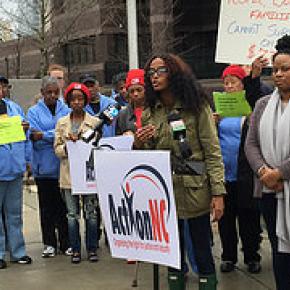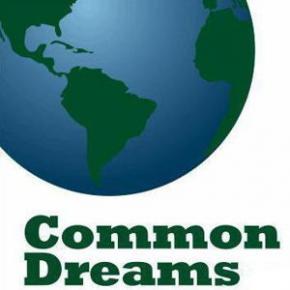Lingo still a barrier to relief
Times Union – August 7, 2013, by Jimmy Vielkind - Immigrant advocacy groups say it remains difficult to get access to...
Times Union – August 7, 2013, by Jimmy Vielkind - Immigrant advocacy groups say it remains difficult to get access to government services in languages other than English — nearly two years after Gov. Andrew Cuomo decreed that written and oral interpretation would be available the state’s six most-spoken foreign languages.
Cuomo signed an executive order that took effect last October mandating state officials to offer language assistance for speakers of Spanish, French, Italian, French Creole, Russian and Chinese. But the order’s scope was necessarily limited to state agencies, even though state-funded services like food stamps, driver’s licenses and unemployment benefits are administered by New York City or other counties.
The groups — including Make the Road New York, the Center for Popular Democracy and the Center for the Elimination of Minority Health Disparities at the University at Albany — visited government offices and surveyed people with limited English proficiency to develop a measure of compliance. In a report released earlier this week, they found that less than half the people who needed language assistance were able to receive it.
According to Nisha Agarwal, deputy director of the Center for Popular Democracy, the survey found 63 percent of citizens using state-operated facilities that are explicitly covered by the order were not successful in their quest to gain language assistance.
“The governor’s team has been very engaged on implementation, and we’re sympathetic to the challenges of getting an entire state apparatus to change,” said Agarwal. “That said, the results are by no means satisfactory, and we were quite disappointed that the state took the position that county-run agencies for state services were not within the ambit of the order. We feel it’s a pretty big gap.”
The Cuomo administration responded by saying that all covered state agencies are in compliance with this executive order
“This report paints an inaccurate picture of reality by relying on visits to county-run agencies that by law fall outside the executive order,” said Cuomo spokesman Richard Azzopardi. “Everyone should have the same access to their government, and we encourage counties to follow the state’s lead.”
Source
Protester who confronted Sen. Flake about Kavanaugh vote: 'Everyone had an impact'

Protester who confronted Sen. Flake about Kavanaugh vote: 'Everyone had an impact'
Though the demonstrators who confronted Sen. Jeff Flake in an elevator over his support of Supreme Court nominee Brett...
Though the demonstrators who confronted Sen. Jeff Flake in an elevator over his support of Supreme Court nominee Brett Kavanaugh have found themselves in the spotlight for their emotional plea, they're crediting everybody who has spoken up with potentially changing Flake's mind.
Read the full article here.
No, 2016 Won't Be the Year of the $20 Minimum Wage
Bloomberg Businessweek - November 13, 2014, by Josh Eidelson - In the midterm elections, four red states—Alaska,...
Bloomberg Businessweek - November 13, 2014, by Josh Eidelson - In the midterm elections, four red states—Alaska, Arkansas, Nebraska, and South Dakota—passed minimum wage increases. Those votes mean that, starting next year, a majority of states will have minimum wages higher than the federal rate. The last time that happened, in 2007, Democrats newly in control of Congress used their power to pass the first national increase in a decade, from $5.15 to $7.25 an hour. It’s extremely unlikely the Republicans who took back the Senate in the midterm elections will do the same. “Waiting for Congress to act is frustrating and, at this point, pointless,” says Ed Flanagan, a former Alaska labor commissioner who spent a year campaigning for his state’s new increase, from $7.75 to $9.75.
Already, labor organizers in Oregon are considering a ballot initiative for 2016 that would raise the state minimum to $15 an hour, matching the leap taken this year by Seattle and San Francisco. In Los Angeles, where Mayor Eric Garcetti signed an ordinance mandating a $15.37 wage floor for some hotel workers in October, 6 of the 15 members of the city council have asked for a vote in early 2015 on a proposal to increase the city’s rate to $15.25 across the board by 2019.
Voters in most states shouldn’t expect to see pushes for higher rates than that anytime soon. Labor activists say they want to end the exclusion of tipped workers such as restaurant wait staff from minimum wage laws and add worker protections, like requiring employers to give workers advance notice of schedule changes or offer paid sick days. That approach worked this year in Oakland, where voters approved a referendum on Nov. 4 that lifts wages only to $12.25 but requires employers to offer paid leave above what the state requires. “When you combine them together, it’s actually more popular,” says Brian Kettenring, co-executive director of the Center for Popular Democracy, a union-backed community organizing group. “People appreciate that you are trying to actually solve the problem.”
Not all the coming fights will be put directly to voters. In California, Democratic Governor Jerry Brown signed a compromise bill last year increasing the statewide minimum from $8 to $10 by 2016. Some Democratic state lawmakers say that’s not enough to help workers make ends meet. “It will still allow the legal payment of a poverty wage,” says Mark Leno, the state senator who sponsored a bill that would have increased minimum pay to $13 by 2017 and then indexed future wage levels to inflation. That passed the state senate in May but failed by a single vote in an assembly committee. Leno plans to revive the issue in the next legislative session.
In some cities, Democrats are pitting themselves against the Republicans who control their state governments. Louisville has held hearings about raising wages to $10.10 after a statewide increase died in the Republican-controlled state senate. City officials in other states are hamstrung by laws prohibiting municipal governments from raising minimum wages above state levels. In June, business-friendly Democrats in Rhode Island’s statehouse killed efforts by the Providence city council to raise hotel pay to $15 an hour with a budget rider barring cities from setting their own minimum wages. In New York, where state law denies cities authority over pay rates, Governor Andrew Cuomo agreed to support changing that statute, along with a statewide increase to $10.10, to win the endorsement of the progressive Working Families Party in the November gubernatorial election. “He made a promise on this,” says Bill Lipton, the party’s New York director. “We expect him to fulfill it.”
Source
Seattle Scales Back Tax in Face of Amazon’s Revolt, but Tensions Linger

Seattle Scales Back Tax in Face of Amazon’s Revolt, but Tensions Linger
Ms. Kniech was one of more than 50 local lawmakers in the United States who sent an open letter to Seattle leaders and...
Ms. Kniech was one of more than 50 local lawmakers in the United States who sent an open letter to Seattle leaders and residents on Monday supporting the tax and criticizing Amazon’s resistance to it. “By threatening Seattle over this tax, Amazon is sending a message to all of our cities: we play by our own rules,” the letter said.
Read the full article here.
Activists: Fed Has Power to Spur Recovery in Poor Communities
The Charlotte Post - March 6, 2015, by Herbert White - America’s economy may be in recovery, but Simone McCray can’t...
The Charlotte Post - March 6, 2015, by Herbert White - America’s economy may be in recovery, but Simone McCray can’t see it.
McCray works at a Charlotte warehouse where she earns $8.10 an hour and lives with family to stretch her budget. A 2010 UNC Charlotte graduate with a degree in psychology, she has yet to land a job in that field.
“You don’t think you’re going to make $8.10 when you go to college,” she said. “That is not what they tell you.”More Americans are working than before the Great Recession of 2008, but African Americans are lagging. Figures released by the U.S. Department of Labor Friday showed the national unemployment rate fell to 5.5 percent in February, an improvement over the previous month.“With another strong employment report, we have now seen 12 straight months of private-sector job gains above 200,000 -- the first time that has happened since 1977,” said Jason Furman, chairman of the Council of Economic Advisers. “Moreover, 2014 was the best year for job growth since the late 1990s and 2015 has continued at this pace. But additional steps are needed to continue strengthening wages for the middle class.”But for African Americans, the jobless rate is double that of whites and the wage gap between the ethnic groups is getting wider.The Federal Reserve, which sets national policy on interest rates, is debating whether to boost the rate as a hedge against inflation. Progressive activists, however, are pushing the Fed to hold the line, arguing low rates will spur a jobs rebound, especially for low-income Americans.“Don’t put any brakes on the economic recovery,” said Pat McCoy, director of Action NC, which held a press conference Thursday to press the Fed. “Not only has it not yet been a full recovery, but in community of color, particularly in the African American community, unemployment rates, underemployment rates remain extremely high.”A study authored by the Center For Popular Democracy found that women and people of color are more likely to struggle to find work that pays a living wage. African Americans are especially hard hit with unemployment rates double the nation as a whole and plummeting wages.“Creating a strong American economy must include prioritizing a genuine recovery for the African American community,” the report summarizes.McCray wants to get in on the recovery. Saddled with debt from student loans, she’s looking for work that will allow her to meet financial obligations. Until then, she’s struggling to make ends meet.“My student loans are going to start going back into repayment and you have to have a way to repay them,” she said. “With jobs that are just above minimum wage, it’s kind of hard to stay afloat and pay your student loans, so you have to stay with family longer and not be out on your own and be independent sooner.”The Fed can help, activists insist, by resisting calls to raise interest rates. Corporate America and conservatives are pushing for an increase to prevent inflation, which is the simultaneous increase in consumer prices and devaluation of currency.“We need to continue to stimulate the economy through low-interest rates in order to serve these communities that need recovery,” McCoy said.As the Fed wrestle with the pros and cons of raising rates, Americans struggling to find work with a living wage are yet to be part of the nation’s limited recovery. Without a robust economic program, millions will be left out.“Only by pursuing genuine full employment will the Fed ensure that the recovery reaches Main Street and Martin Luther King Boulevard – and communities of working people throughout the country,” the CPD report’s authors wrote. “As the Fed makes crucial monetary policy decisions in the months and years to come, it must ensure that all communities can share in the prosperity of a functional economy.”
Source
The Price of Defunding the Police
A new report fleshes out the controversial demand to cut police department budgets and reallocate those funds into...
A new report fleshes out the controversial demand to cut police department budgets and reallocate those funds into healthcare, housing, jobs, and schools. Will that make communities of color safer?
Read the full article here.
Second Draft of Scaffold Report Released
Times Union - September 3, 2014, by Casey Seiler - SUNY's Nelson A. Rockefeller Institute of Government has released a...
Times Union - September 3, 2014, by Casey Seiler - SUNY's Nelson A. Rockefeller Institute of Government has released a second draft of its controversial report on New York's Scaffold Law. According to the Institute's Deputy Director for Operations Robert Bullock, it's the only remaining version of the report that was shared with the report's funder, the state Lawsuit Reform Alliance.
The business-backed group, which opposes Scaffold Law, paid $82,800 to fund the report — sponsorship that has led critics to attack the study as advocacy in the guise of research. Its authors, however, insist the research was conducted in good faith.
Scaffold Law, which places "absolute liability" on employers for gravity-related workplace injuries, is supported by labor unions but opposed by business groups that claim it needlessly drives up construction costs — a thesis backed up in part by the report. Opponents would like to see New York follow other states by adopting a "comparative negligence" standard that would make workers proportionately responsible when their actions contribute to an accident.
The Center for Popular Democracy, a labor-backed group that supports Scaffold Law, lambasted the report upon its release last winter and requested copies of all communications between the institute and the Lawsuit Reform Alliance. That FOIL request produced a series of emails between researchers and LRA Executive Director Tom Stebbins, including Stebbins' suggested edits to a June 25, 2013, draft copy of the report that was not initially released by the institute.
The center appealed to SUNY, which ultimately released the June 25 draft. A comparison of the draft and the final report suggested that some of Stebbins' suggestions were reflected in the final version. Researchers, however, said any changes were the result of their efforts to sharpen their analysis, and not made due to pressure from the funder.
The newly released draft, dated Aug. 7, 2013, closely resembles the final report.
The center's Josie Duffy claims the six-week gap between the first and second drafts suggests that the institute moved quickly to follow the alliance's edits.
"SUNY says it has now disclosed everything it has, but given that LRANY and the authors held weekly conference calls to discuss the report's progress, we may never know the full extent of their influence over the final version," she said.
In an email, Bullock said the institute "has been open and honest about its contacts with funders and its research has been and will continue to be immune from influence."
"It is unfortunate," he added, "that a research organization known throughout the nation for the quality and character of its work should have to defend itself from accusations leveled by the Center for Popular Democracy, an organization well known for its partisanship."
Source
Walter Isaacson to sit on City Planning Commission, and other area political news

Walter Isaacson to sit on City Planning Commission, and other area political news
Isaacson to sit on City Planning Commission Author and former CNN CEO Walter Isaacson may be only a part-time resident...
Isaacson to sit on City Planning Commission
Author and former CNN CEO Walter Isaacson may be only a part-time resident of New Orleans, but Mayor Mitch Landrieu has appointed him to the City Planning Commission.
Isaacson, 64, who now heads the Aspen Institute in Washington, D.C., will replace lawyer Alexandra Mora in January.
The City Council approved the appointment Thursday.
“I'm deeply honored and excited about the prospect of helping to protect the city and plan for its future,” said Isaacson, who splits his time between New Orleans and Washington.
Isaacson, a New Orleans native, is also a former editor of Time magazine and the author of books about Steve Jobs, Albert Einstein, Benjamin Franklin, Henry Kissinger and the "group of hackers, geniuses and geeks (who) created the digital revolution."
He was vice chairman of the Louisiana Recovery Authority, the agency that oversaw the state’s rebuilding after Hurricane Katrina. He is also on the boards of Tulane University and the New Orleans Tricentennial Commission.
Landrieu also appointed Jason Hughes to the commission to fill the unexpired term of Nolan Marshall III, who left New Orleans in October for a job in Dallas.
Hughes’ tenure will end in 2021, while Isaacson's will end in 2023.
City Council condemns anti-Muslim rhetoric
At the end of a heated election season that has included calls from Republican presidential nominee Donald Trump to ban Muslims from entering the country, the New Orleans City Council approved a resolution Thursday condemning anti-Muslim rhetoric.
The resolution is part of a national effort by the liberal group Local Progress to get similar measures passed across the country
"We have seen dangerous levels of anti-Muslim and racist rhetoric as well as a rise in hate crimes," said Councilwoman LaToya Cantrell, a board member of Local Progress. "This rhetoric and violence is not only a threat to our communities but also a direct threat to us as U.S. citizens."
The resolution passed 6-0, with Councilman Jason Williams absent.
"Love really does trump hate," Cantrell said, echoing a slogan used by Democratic presidential nominee Hillary Clinton.
The resolution says the council "condemns all hateful speech and violent action directed at Muslims, those perceived to be Muslims, immigrants and people of color," "categorically rejects political tactics that use fear to manipulate voters or to gain power or influence" and "reaffirms the value of a pluralistic society, the beauty of a culture composed of multiple cultures, and the inalienable right of every person to live and practice their faith without fear."
Clinton is expected to easily carry New Orleans in Tuesday's election.
Jeff council backtracks, OKs disputed contract
The Jefferson Parish Council on Wednesday suspended a disputed ordinance in order to keep the parish's Carnival parades rolling in 2017, hiring a company owned by a local political consultant to build the grandstands from which revelers will cheer on the annual spectacle.
The council voted 7-0 to suspend a ban passed a year ago that would prevent parish contracts from being awarded to any firm partially owned by a consultant who had represented an elected official during a prior election.
That ordinance, which was proposed by Councilman Chris Roberts last November, is under challenge in federal court.
Buisson Creative, a firm owned by political consultant Greg Buisson, was the only firm to respond to the most recent request for proposals to provide the grandstands for the upcoming Carnival season.
Because of the pending legal challenge and the fact that no other proposals for the work were submitted, the council suspended the ban and also voted 6-0 to negotiate a contract with Buisson Creative. Roberts abstained from that vote.
The ordinance was controversial because some saw it as being aimed specifically at Buisson, who had just worked for Roberts’ political opponent in the prior election cycle.
Roberts dismissed the criticism, saying the ordinance was a good-government measure designed to prevent conflicts of interest by making sure those who worked on political campaigns did not then get contracts with parish government.
BGR: Its report to save taxpayers millions
The Bureau of Governmental Research put out a release last week taking credit for uncovering an issue that it said is "expected to yield millions in savings to taxpayers."
On Oct. 27, an Orleans Parish Civil District Court judge ruled in the city's favor on how to apply the formula for calculating pension benefits for city firefighters. The BGR release said the "matter stemmed from a 2013 report in which BGR revealed that the New Orleans Firefighters' Pension and Relief Fund was applying the benefits formula on more generous terms than those spelled out in state law."
The court order directs the fund "to apply the formula as set forth in law," the research group said.
"According to a pension consultant's estimate, if the formula were properly applied to current employees alone, taxpayers would save roughly $1.3 million per year. But under the judgment, the formula is to apply to current retirees as well, increasing the potential savings," BGR said.
By Jessica Williams, Jeff Adelson, Chad Calder and Bruce Eggler
Source
America Has Become A Tyranny of the Few - But We Can Fight It
America Has Become A Tyranny of the Few - But We Can Fight It
We’re in the thick of the second post-Citizens United presidential campaign, and it’s already clear that allowing...
We’re in the thick of the second post-Citizens United presidential campaign, and it’s already clear that allowing unlimited funds to influence political elections was a terrible idea.
Half of the funds supporting presidential candidates from both parties comes from a mere 158 families — a miniscule percentage of America’s 120 million households — as documented by a recent New York Times investigation. Largely white, older, male, and Republican, they are also unrepresentative of what our multicultural society looks like.
As a result of this narrow group of donors controlling what’s on the political agenda, America has a fundamentally undemocratic system in which working class people and people of color are left on the margins, silenced in a political debate, they can’t gain access to — because they don’t have millions to share.
America has become a tyranny of the few, and Americans are fed up with the broken system. Last week, voters in Maine elected to increase funding from $2 million to $3 million for the Clean Elections Fund, which provides government grants to candidates who agree to limit their spending and private fundraising. It might be a long time before Citizens United is overturned. In the interim, it’s important that other states introduce similar legislation challenging existing financing models.
The tyranny of the few is two-pronged, however. Not only are our elected leaders being held accountable to wealthy donors instead of the people of our nation, the least privileged of this nation are simultaneously facing strong barriers to voting.
Our antiquated voter registration system results in roughly 62 million eligible voters not registered, either because they never registered or their registration information is incorrect. In a 2008 Current Population Survey, blacks and Latinos cited “difficulties with the registration process” as their main reason for not registering to vote. Whites disproportionately reported not registering because they were “not interested in elections or politics.” Barriers to voting registration are in many states especially well in place for people of color, workers and youth, who are targeted by voter suppression laws.
We could put an end to the error-ridden old-fashioned manual voter registration and step into the 21st century with automatic voter registration. Other states could follow the example set by California and Oregon, which are linking voter registration to the Department of Motor Vehicles. Through linking voter registration with public offices such as the DMV, revenue agencies, the Postal Service and others, the United States could secure over 56 million more voters, as a report from Center for Popular Democracy shows.
So to sum up: people of color and working class Americans aren’t just unable to place millions of dollars with politicians who will take care of them in Congress, they aren’t even able to vote for leaders who might serve their interests.
The outcome? Our America has become an oligarchy run by a tiny and overly privileged section of its population, whose lives and wishes for our nation are in stark opposition to the lives and dreams of the average American.
This is borne out in our legislation. Despite overwhelming public support for policies such as taxing those who earn more than $1 million a year, and laws that address inequality, workers’ rights, and protection of the middle class, we see the footprints of corporate powers all over our legislation.
We need to act fast by passing laws that disrupt this undemocratic cycle. We must break Congress’ dependency on big money and return the power to the people, but we can’t only rely on our lawmakers to change our nation.
It will take a lot of work, but we can’t allow for this undemocratic oligarchy to go on. Let’s not leave the future of our country in the hands of the wealthiest, let’s instead bring back democracy to our nation.
Source: Common Dreams
Why the Phrase 'Late Capitalism' Is Suddenly Everywhere
An investigation into a term that seems to perfectly capture the indignities and absurdities of the modern economy......
An investigation into a term that seems to perfectly capture the indignities and absurdities of the modern economy...
Read the ful article here.












2 months ago
2 months ago